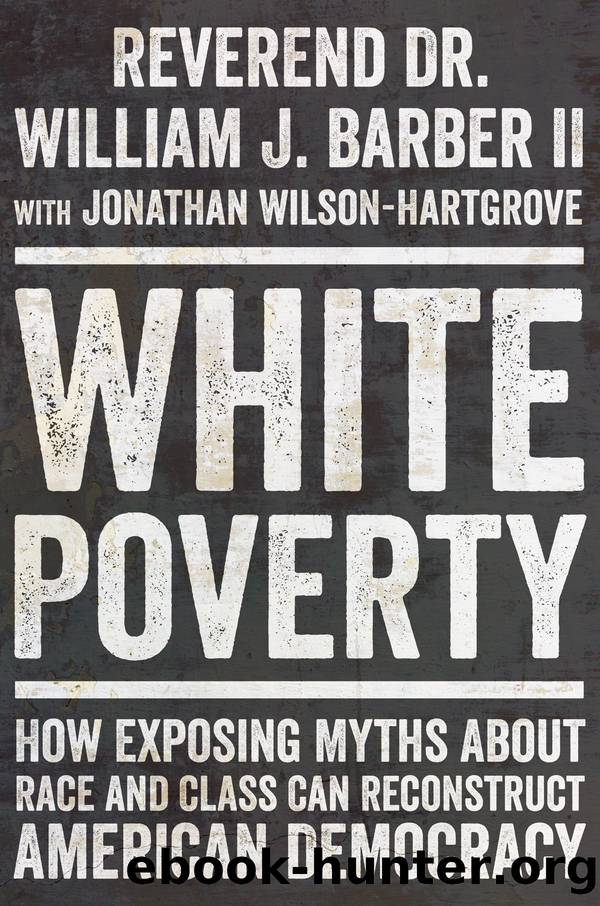White Poverty by William J. Barber II

Author:William J. Barber II
Language: eng
Format: epub
Publisher: Liveright
Chapter 8
POOR PEOPLE ARE THE NEW SWING VOTERS
I have spent enough time with poor white folks in America to know that the people themselves are not the problem. Whenever someone asks, âIs it race or is it class?,â my answer is, âYes, it is.â
When I go to the hollers of Eastern Kentucky or a small town in Kansas, I never shy away from talking about race. I am a Black man who knows that racism is Americaâs original sin.
âBut doesnât all that talk about slavery and Jim Crow just keep us stuck in the divisions of the past?â some ask.
âOnly if we misunderstand the past,â I say.
Yes, Americaâs history is rife with violence that has denigrated Black people and set our white neighbors against us. When we tell the truth about the movements that successfully challenged slavery and Jim Crow, though, we know that they were multiracial fusion movements. This is why we canât ignore race. Poor white people in America today can learn from the long struggle for racial justiceâjust as the folks up in Mitchell County chose to learn from the NAACP and the community in Belhaven followed Mamie Tillâs example to challenge the violence of unnecessary death in their community. Moral fusion means always understanding the role race plays in public life.
When I talk about race, I insist on talking about it along with an analysis that helps folks understand how all poor people suffer when weâre pitted against one another.
âBut if you focus on the class struggle that poor Black people share with poor white people,â others ask, âdoesnât that diminish the particular suffering Black people experience in a white supremacist society?â
âOnly if we allow our suffering to define who we are.â
Race has shaped a world where people suffer differently, and we must never diminish the struggle that anyone faces because of the particular ways this worldâs injustices have piled up on them. Still, no one ever wins a competition of trying to prove that their pain hurts worse than someone elseâs. When we are honest, we have to acknowledge that injustice may touch us in different ways, but it has a universal effect of choking the life out of our dreams and possibilities. There is a leveling effect to the graveyard, where all whoâve been beaten up by this worldâs evils are equally dead.
In the Bible, God tells the prophet Ezekiel to warn the people that there is âa conspiracy of her princes within her like a roaring lion tearing its prey.â Political leaders in Ezekielâs day cared more about power than they did about the people who were crushed by their policy violence. The data of Ezekielâs day made this clear, but God called Ezekiel to try to articulate the severity of the situation. So the prophet looked to the natural world and compared the political leadership first to a roaring lion, and later to ravenous wolves. âThey shed blood and kill people to make unjust gain,â Ezekiel said plainly. He also pointed out that religion had been distorted to prop up this extremism.
Download
This site does not store any files on its server. We only index and link to content provided by other sites. Please contact the content providers to delete copyright contents if any and email us, we'll remove relevant links or contents immediately.
Cecilia; Or, Memoirs of an Heiress — Volume 1 by Fanny Burney(32558)
The Great Music City by Andrea Baker(32019)
Cecilia; Or, Memoirs of an Heiress — Volume 2 by Fanny Burney(31956)
Cecilia; Or, Memoirs of an Heiress — Volume 3 by Fanny Burney(31942)
We're Going to Need More Wine by Gabrielle Union(19046)
All the Missing Girls by Megan Miranda(16028)
Pimp by Iceberg Slim(14507)
For the Love of Europe by Rick Steves(14121)
Bombshells: Glamour Girls of a Lifetime by Sullivan Steve(14075)
Talking to Strangers by Malcolm Gladwell(13370)
Norse Mythology by Gaiman Neil(13365)
Fifty Shades Freed by E L James(13241)
Mindhunter: Inside the FBI's Elite Serial Crime Unit by John E. Douglas & Mark Olshaker(9343)
Crazy Rich Asians by Kevin Kwan(9292)
The Lost Art of Listening by Michael P. Nichols(7506)
Enlightenment Now: The Case for Reason, Science, Humanism, and Progress by Steven Pinker(7313)
The Four Agreements by Don Miguel Ruiz(6765)
Bad Blood by John Carreyrou(6621)
Weapons of Math Destruction by Cathy O'Neil(6280)
